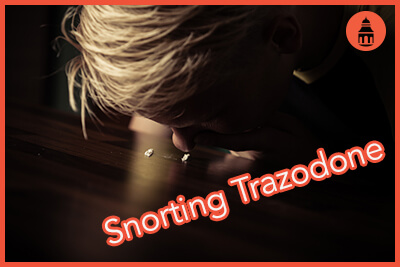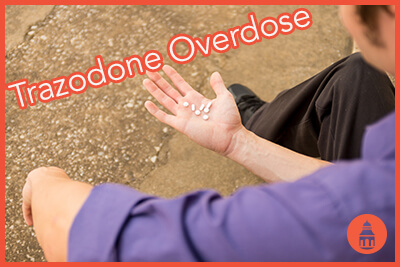
The brand names Desyrel and Oleptro contain trazodone, a drug that works as a serotonin antagonist and serotonin reuptake inhibitor. This means that its actions are designed to increase the amount of serotonin in the brain and spinal cord. The drug was developed as an antidepressant drug, designed to treat clinical manifestations of depression, but it is more often used for its ability to produce sedation and reduce anxiety.
Despite what many people are told by nonmedical sources, antidepressant medications do not produce extreme happiness or euphoria. Taking an antidepressant medication will not result in a person experiencing a “high” like that associated with using other types of prescription medications, such as prescription pain medications or benzodiazepines. Antidepressant medications do require a prescription from a physician, but they are not listed as controlled substances by the United States Drug Enforcement Administration (DEA).
Trazodone and Antidepressant Abuse
Even though trazodone and other antidepressant drugs are not significant drugs of abuse, it is important to note that any drug can be abused by individuals who are attempting to experiment with drugs. A 2014 review in the journal Substance Abuse and Rehabilitation found that most of the reports of antidepressant abuse in the research literature were case studies, indicating that these drugs are not significant drugs of abuse that are abused by large numbers of people. The review also found no reports of abuse of trazodone products.
In addition, the Substance Abuse and Mental Health Services Administration (SAMHSA) releases annual estimates of the use and misuse of drugs that are considered to be significant drugs of abuse. SAMHSA does not release figures for antidepressant medications in its annual review because these drugs are not significant drugs of abuse.
People who have been diagnosed with some other mental health disorder have a high rate of substance misuse and abuse, and individuals who have been placed on antidepressant medications may misuse or abuse their antidepressant medication because they believe it is not working, or they are under the mistaken notion that the drug will produce some form of euphoric effects. For example, these individuals may believe that because antidepressant medications relieve depression, taking more of the drug will result in the opposite effect of depression. Instead, overdoses of antidepressants are more likely to produce anxiety, irritability, nausea, vomiting, etc.
According to the review in the above study, most of the individuals who abuse antidepressants have co-occurring mood disorders like major depression or a co-occurring substance use disorder, such as alcohol abuse, narcotic pain medication abuse, etc.
There is some older research that mentioned some case studies where the abuse of trazodone occurred. A 1994 research study reported what is likely the first documented case of abuse of Prozac and trazodone together. A 1999 study compared three medications, Ambien, Halcion, and trazodone, for their abuse potential. Ambien and Halcion are sedative drugs that are commonly used to produce sleep and have different mechanisms of action than trazodone. The findings of the study indicated that trazodone was significantly less likely to be abused than the other drugs, signifying that while there may be some potential for abuse for trazodone, this potential is significantly lower than other drugs used to produce sleep.
Nonetheless, there are anecdotal reports of individuals abusing trazodone, and there are even a few scattered reports of individuals grinding up trazodone pills and snorting them. When drugs are taken by insufflation (snorting), they reach the brain much more quickly than if one takes them orally.
Regularly snorting trazodone would qualify for misuse of the drug, and if the individual developed problems in areas of their functioning as a result of their use of trazodone in this manner, they could be diagnosed with a substance use disorder. In addition, snorting trazodone would also be more likely to produce significant side effects.
Side Effects of Trazodone
Every medication or illicit drug may produce side effects. With medical use of trazodone, side effects are rare, but they can occur. The Food and Drug Administration (FDA) lists the major side effects that occur with use of trazodone as:
- Gastrointestinal issues, such as nausea, constipation, diarrhea, and vomiting
- Dizziness, headaches, dry mouth, weakness, or extreme tiredness or lethargy
- Reddened eyes, ringing in the ears, numbness or tingling, or burning sensations
- Muscular pain, shakiness, tremors, and problems with coordination
- Anxiety, problems with concentration, weight gain or weight loss, loss of the sexual desire, nightmares, and/or confusion
Very rare side effects can occur for people who use or abuse trazodone. If these occur, the person should immediately contact their physician. They include:
- Increased feelings of suicide (more likely to occur in children and adolescents but can occur across all ages)
- Extremely fast or pounding heartbeat, chest pains, or shortness of breath
- Bruising or bleeding
- For men, painful erections or erections that do not subside
- Fainting spells, becoming unconscious, or displaying seizure-like behaviors
Individuals who snort trazodone are not taking it according to its prescribed purposes. Snorting trazodone can also lead to problems with the nasal passages, including issues with extremely stuffy nose, runny nose, bleeding, and even a perforated septum, which can be dangerous if it becomes infected. Chronically snorting the drug may also result in respiratory problems that can lead to chronic health issues.
Overdose

Long-term abuse of trazodone is extremely rare, and abuse of trazodone alone is also rare. As mentioned above, the drug has very little recreational use value.
Typically, when antidepressant drugs are abused, they are taken with other drugs like alcohol. However, snorting trazodone could lead to a potential overdose of the drug. Overdoses on antidepressant drugs are rare, except in cases where someone attempts to use too much of the drug to deal with severe emotional distress or in individuals who take multiple drugs in an attempt to commit suicide. An overdose of trazodone could lead to several different life-threatening groups of symptoms.
- Overdose on the drug might produce severe gastrointestinal issues, such as vomiting, stomach cramps, severe nausea, etc., and this could lead to dehydration if not checked.
- Because trazodone does have a sedative effect, an overdose could lead to respiratory depression (significant slowing of breathing rate) that could result in significant damage to the brain if the respiratory depression was severe.
- Overdose of trazodone could produce significant cardiovascular issues, including heartbeat irregularities, problems with blood pressure, and an increased potential for heart attack or stroke.
- The sedative effects of trazodone could lead to issues with muscle coordination, dizziness, and significant drowsiness that could lead to a potential for an individual to become involved in an accident.
- In very high doses, it is certainly possible for the drug to initiate hallucinations, seizures (especially if mixed with other drugs of abuse), or other serious issues in some people.
There is no antidote for an overdose on trazodone; instead the treatment would be specific to the symptoms displayed. An individual who is suffering severe respiratory depression might be intubated; someone with severe gastrointestinal problems might receive treatment for that; individuals who are severely sedated might be given a mild stimulant; and in most cases, IV fluids would be administered.
The effects of abusing trazodone with other drugs could be potentially more serious. Individuals who are abusing trazodone with other central nervous system depressant drugs like alcohol may increase their risk of experiencing respiratory depression, seizures, potential comatose states, etc. If someone suspects that someone has overdosed on trazodone, they should call emergency medical services immediately (911).
